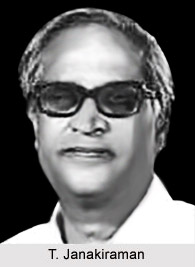 T. Janakiraman, also known as Thi Janakiraman or Thi Jaa, was a renowned author from Tamil Nadu who is regarded as one of the most significant Tamil writers of the 20th century. His literary works have greatly helped in the development of Tamil fiction. T. Janakiraman was born on 28 February 1921 in a Tamil Brahmin family, in Madras Presidency. Janakiraman`s composition style was very basic and narrative. Some of his most popular Tamil novels include Amma vandal, Sembaruthi and Mogamul. All of the novels written by T. Janakiraman have feminine feelings incorporated in the themes. The author provides a spontaneous and flawless narration and the plots are usually crafted around delicate human emotions and feelings. Some of the short stories written by T. Janakiraman in Tamil language like Langdadevi and Mulmudi were also written in the same composition and narrative style.
T. Janakiraman, also known as Thi Janakiraman or Thi Jaa, was a renowned author from Tamil Nadu who is regarded as one of the most significant Tamil writers of the 20th century. His literary works have greatly helped in the development of Tamil fiction. T. Janakiraman was born on 28 February 1921 in a Tamil Brahmin family, in Madras Presidency. Janakiraman`s composition style was very basic and narrative. Some of his most popular Tamil novels include Amma vandal, Sembaruthi and Mogamul. All of the novels written by T. Janakiraman have feminine feelings incorporated in the themes. The author provides a spontaneous and flawless narration and the plots are usually crafted around delicate human emotions and feelings. Some of the short stories written by T. Janakiraman in Tamil language like Langdadevi and Mulmudi were also written in the same composition and narrative style.
Literary Works of T. Janakiraman
T. Janakiraman wrote around a dozen novels and almost one hundred short stories. Perhaps his most renowned work in the novel titled Mogamul, meaning Thorn of Desire. The novels Marappasu and Amma Vandhal by Janakiraman have been translated into English, titled as Wooden Cow and Sins of Appu`s Mother respectively. T. Janakiraman`s short stories are composed in an artistic and simple manner. Some of his other noteworthy works include Uyirthen, Malar Manjam and Semparuthy.
Avalum Umiyum, one of his long stories depicts the dissimilarity between emotion and intellect. The work is written in the local language of Tanjavur. Further more, the story aptly utilised the author`s experience and knowledge about the lives of the villagers in the district of Tanjavur. The heterogeneous and homogeneous aspects of village and town life are also expressed effectively. Avalum Umiyum also implements aversion and sarcasm appropriately. The short story named Civappu Riksa reveals the urbanity of a woman when she becomes upset after she hears rude and indecent comments of some youths. The egotistical behaviour of a rich man of an established family in a village is brilliantly represented in Tevar Kutirai. The story Kopura Vilakku comprises of a revolutionary subject matter. The story narrates the tale of a woman who becomes a concubine in order to financially support her family. After the woman dies, the populace of the town denounces her without even realising the massive sacrifice she made. Again, some of the views based on ignorant beliefs are criticised by Janakiraman in the novel known as AmmaVantal.
Some of the short stories written by T. Janakiraman are collected in the work of Akpar Castiri. The stories in the compilation express humour, idiosyncrasy, sarcasm and wit. The stories were composed in a brief manner with brilliant form, which is a precondition for writing short stories. The characterization is outstanding and neither mental attitudes nor events are analysed in the works. Amongst the novels written by T. Janakiraman, Mokamul is perhaps the most significant. Another work entitled Uyirtten portrays a young man, who moves to a village in search of peace of mind but eventually gets entangled in problems of the locality.
Some of the Tamil novels written by Janakiraman include Adi, Nalabaagam, Marappasu, Semparuthi, Uyirthen, Amma Vandhaal, Sivagnanam, Anbe Aaramudhe, Kamalam, Mogamul, Malar Manjam and Amirtham. He wrote many short stories as well, like Aboorva Manidhargal, Erumai Pongal, Manidhabimaanam, Sakthi Vaithiyam, Pidi Karunai, Yaadhum Oore, Akbar Shastri, Sivappu Rickshaw and Kottumelam. Apart from these T. Janakiraman wrote various other plays and travelogues namely Karunkadalum Kalaikkadalum, Adutha Veedu Aimbadhu Mile, Nadandhaai Vaazhi Kaveri, Udhaya Sooriyan, Vadivelu Vaathiyaar, Naalu Veli Nilam and Doctorukku Marundhu. He had translated the works of Annai and Kullan.
T. Janakiraman or Thi Jaa was honoured with the Sahitya Akademi Award for Tamil for his short story collection Sakthi vaidhiyam in the year 1979. He died on 18 November 1982.













